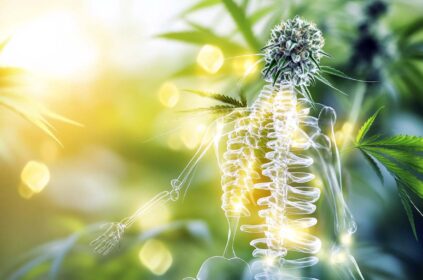Introduction
Osteoporosis affects millions of Americans, particularly those over 50, with its insidious progression leading to brittle bones and an increased risk of fractures. As individuals and healthcare professionals seek new ways to combat this condition, the focus has turned to cannabidiol, or CBD, a prominent compound in the hemp plant. This article will explore the potential effects of CBD on bone health, particularly in relation to osteoporosis, examining the science, benefits, and practical applications.
Understanding Osteoporosis
Osteoporosis is a debilitating condition where bones lose density and strength, making them more susceptible to fractures. According to the National Osteoporosis Foundation, over 53 million Americans are affected by osteoporosis or are at high risk due to low bone mass. Fractures from osteoporosis typically occur in the hip, vertebrae, and wrist, leading to significant health complications, diminished quality of life, and increased mortality rates, especially in the elderly.
The Role of the Endocannabinoid System in Bone Health
To appreciate how CBD might influence bone health, it is essential to understand the endocannabinoid system (ECS). The ECS consists of cannabinoid receptors, such as CB1 and CB2, which are present in various tissues, including bone. These receptors help regulate numerous physiological processes, including bone remodeling—the continuous process where old bone is replaced by new bone.
Research indicates that the ECS plays a crucial role in maintaining bone health. Osteoblasts (cells responsible for bone formation) and osteoclasts (cells responsible for bone resorption) are influenced by the activities of cannabinoid receptors. Proper balance in their function is vital for preserving bone density and overall skeletal integrity.
CBD and Bone Density
Emerging research suggests that CBD may have a positive impact on bone density. Here are some key points highlighting its potential effects:
- Inhibition of Osteoclast Activity: Studies have shown that CBD can block the GPR55 receptor, which is linked to an increase in osteoclast activity. By inhibiting this receptor, CBD may reduce bone degradation, thus helping to preserve bone density.
- Enhanced Bone Formation: Animal studies indicate that CBD can promote the activity of osteoblasts. By doing so, it enhances the creation of a stronger bone matrix, improving mineralization and making bones less prone to fractures.
CBD and Osteoporosis
The prospect of using CBD as a treatment for osteoporosis is gaining traction. Key insights from current research include:
- Preclinical Studies: Investigations have suggested that CBD may help slow down or even reverse bone loss associated with osteoporosis. Preliminary studies indicate that CBD can decrease bone resorption and promote bone formation, positioning it as a potentially effective treatment option.
- Bone Healing: An exciting dimension of CBD research is its impact on bone healing. In one notable animal study, rats with fractures experienced significantly improved healing outcomes after being treated with CBD alone or in combination with THC. This study demonstrated not only quicker recovery times but also stronger healed bones.
Nutritional Factors and Bone Health
While CBD shows potential benefits, a holistic approach to bone health involves considering essential nutrients that support skeletal integrity:
- Calcium and Vitamin D: These nutrients are critical for strong bones. Calcium is a primary building block of bone tissue, while vitamin D assists with calcium absorption. A deficiency in either can significantly weaken bone strength.
- Vitamin K and Magnesium: Vitamin K plays a vital role in bone metabolism, crucial for activating the proteins needed for bone mineralization. Magnesium helps facilitate numerous biochemical reactions necessary for bone integrity, including the conversion of vitamin D into its active form.
Market Impact and Trends
The growing interest in CBD’s health benefits has resulted in a booming market for hemp-derived products across the United States. Observations include:
- Increased Demand: There is escalating consumer interest in natural health solutions, propelling a growth trend for CBD products. As more scientific research validates CBD’s benefits, this demand is expected to intensify.
- Regulatory Landscape: The legalization of industrial hemp cultivation in 2018 has paved the way for a diverse array of CBD products. However, as the market expands, consistent regulations regarding safety and efficacy remain necessary to protect consumers.
Conclusion
The intersection of CBD and bone health, particularly concerning osteoporosis, represents a promising area of exploration. While preclinical studies suggest that CBD can inhibit harmful osteoclast activity, stimulate bone formation, and enhance healing processes, more clinical research is required to solidify these findings in humans.
Actionable Tips
For those considering the benefits of CBD for bone health, here are some practical recommendations:
- Consult Healthcare Professionals: Engaging with healthcare providers before starting any CBD regimen is important to ensure safe and effective use based on individual health needs.
- Prioritize a Balanced Diet: Maintaining adequate intake of calcium, vitamin D, vitamin K, and magnesium will support overall bone health and complement any potential benefits from CBD.
- Stay Informed: Following trustworthy sources for ongoing research developments and updates on CBD and bone health will help you stay educated on this evolving topic.
Next Steps
As interest in CBD and its implications for bone health grows, consider these proactive steps:
- Support Continued Research: Advocacy for further clinical studies is crucial for validating CBD’s potential role in treating osteoporosis and related conditions.
- Choose Quality Products: If you decide to use CBD, opt for products from reputable manufacturers who adhere to rigorous quality standards to ensure safety and effectiveness.
Incorporating CBD into a holistic approach to bone health could open new pathways for individuals seeking to strengthen their bones and reduce the risk of osteoporosis-related fractures. As research evolves, so too does the potential for CBD to serve as a beneficial tool in the quest for healthier bones.




















